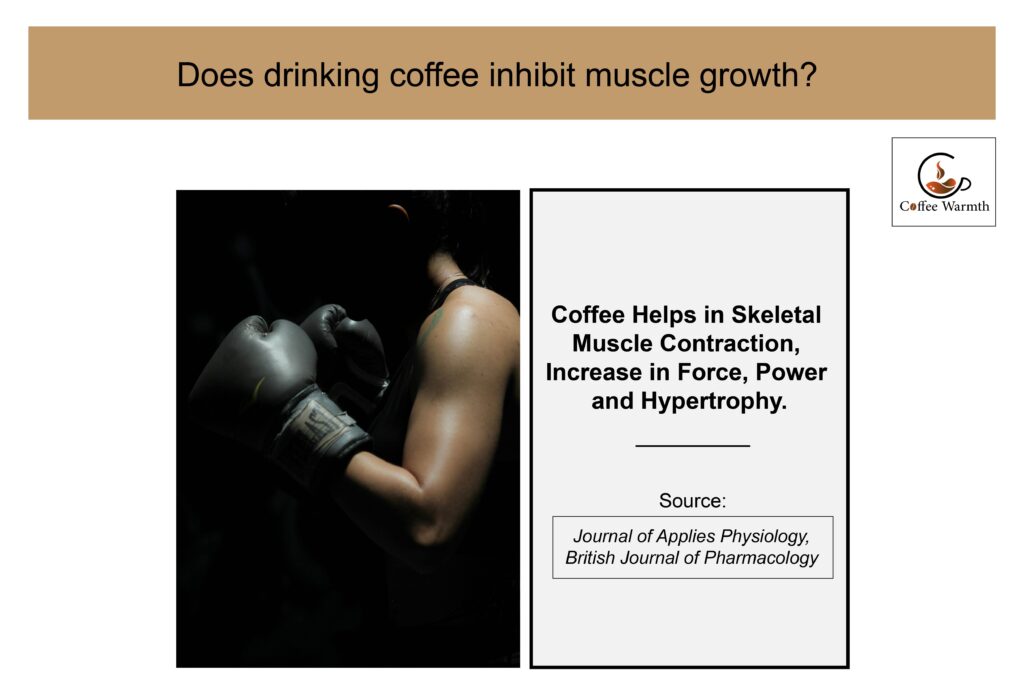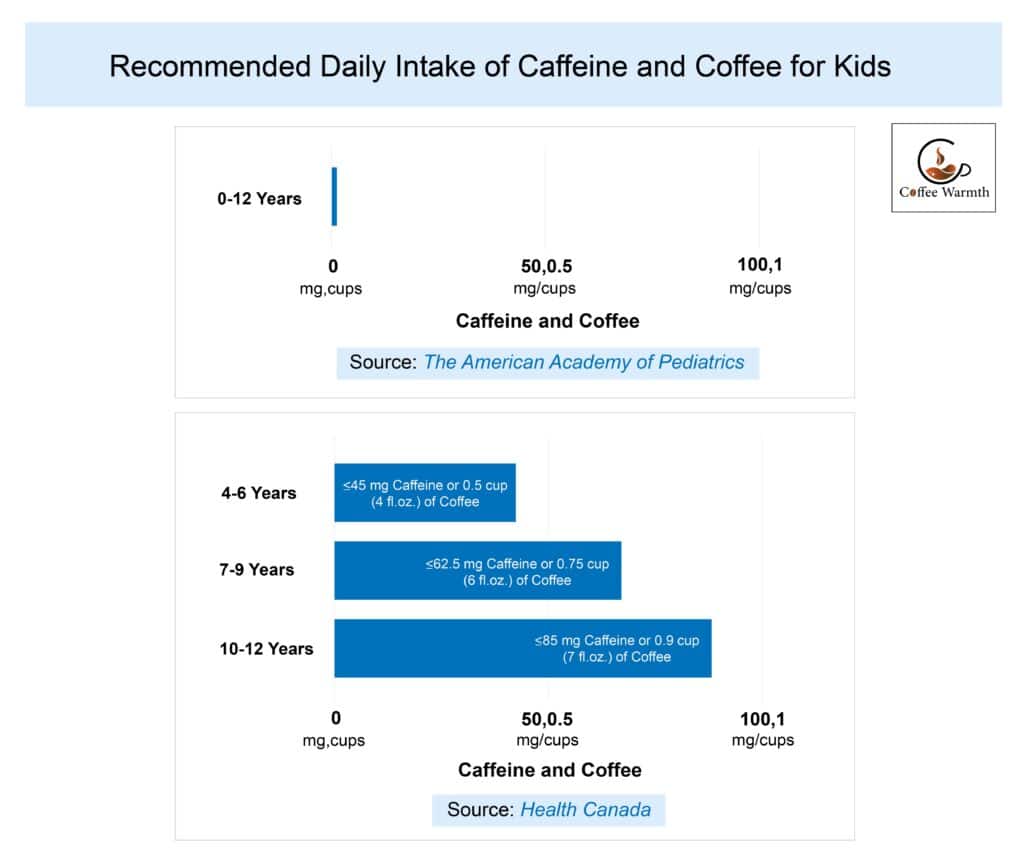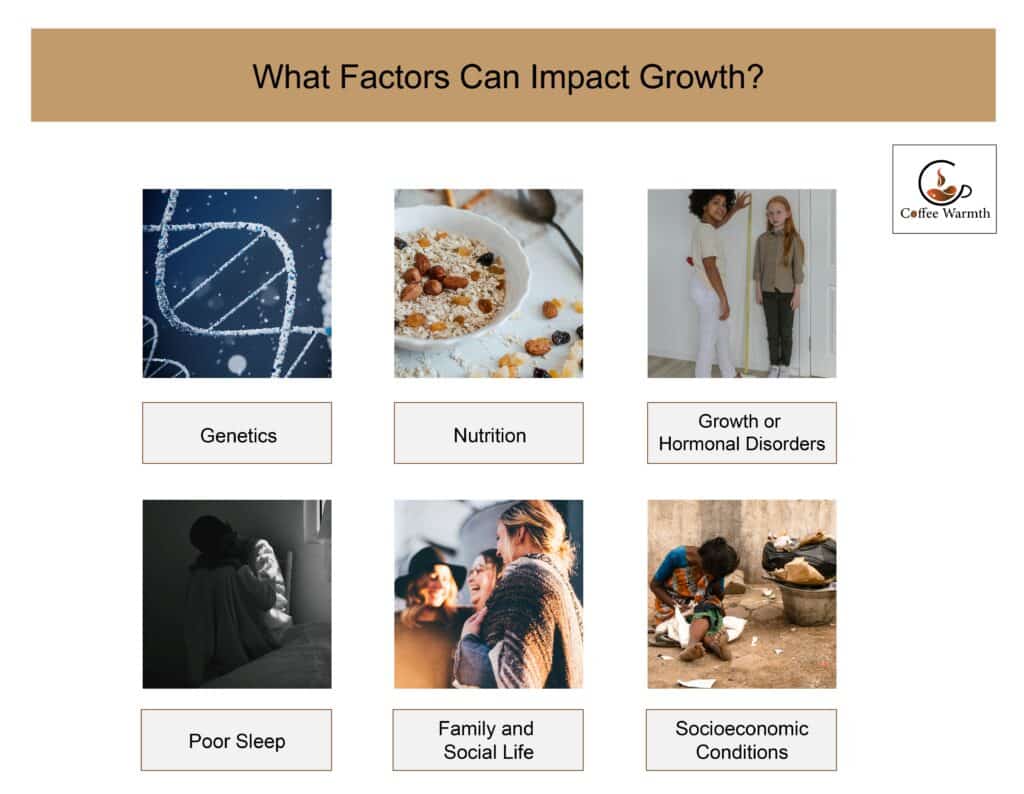No, coffee does not stunt your growth but it can trigger other factors which may lead to stunted growth. Drinking coffee can affect your sleep patterns and regular sleep disturbances in childhood can lead to growth hormone deficiency. A few hours lost here and there don’t take inches’ off your height but a frequent poor sleep can. Caffeine in coffee further aggravates the situation by suppressing your appetite which can lead to malnourishment in the long term. Poor eating and sleeping habits combined can stunt growth in kids.
Drinking coffee doesn’t stunt brain growth but can affect neurodevelopmental behaviors in children. Caffeine in coffee also doesn’t impact muscle growth or reduce bone density. Infact, studies show a positive effect on muscle growth.
According to the American Academy of Pediatrics, kids should not consume coffee at all whereas teenagers can drink an 8 fl.oz. cup daily. Health Canada allows small amounts of daily caffeine intake for kids under the age of 12 years. However, most experts advise that it’s best to avoid drinking coffee at such a tender age.
Does coffee stunt your growth?
No, there is no scientific evidence that coffee stunts your growth. However, caffeine in coffee may cause the following problems as depicted in the figure below which can impact the growth of a child.

- Coffee causes sleep disturbances
Drinking coffee in the evening or night causes sleep disturbances in people of all ages. Drinking coffee decreased sleep quality and release of growth hormone in children, according to a study in the British Journal of Surgery. This is because growth hormones are released during night sleep and consistent lack of sleep results in suppression of growth hormones which may stunt your growth.
- Coffee is an appetite suppressant
Caffeine in coffee is an appetite suppressant. It may lead to lack of nutritional intake which can impact growth. In extreme cases, it may even lead to malnutrition so it’s best to limit caffeine intake to ensure better nutrition. A study published in the GSC Biological and Pharmaceutical Sciences in 2022, found that drinking coffee twice daily suppresses the appetite.
- Maternal coffee leads to shorter babies
Body metabolizes caffeine in coffee slower during pregnancy, so it passes into the fetus. The fetus can not metabolize caffeine so it can lead to growth retardation and low birthweight. Caffeine consumption of pregnant women may give birth to shorter babies with increasing height gaps till the age of 8 years according to a study published in the Journal of the American Medical Association in 2022.
At what age do you stop growing in height?
Girls stop growing height at 14-15 years and boys stop growing height at 18 years.
Both girls and boys have a growth spurt during puberty. Girls add 2-3 inches or 5.08-7.62 cm per year during their growth spurt which stops a year or two after the menarche. Meanwhile, boys add 3 inches or 7.62 cm per year on average which stops after four years of puberty.
According to the 2007 WHO reference values, girls might add a maximum 1-2 cm in their height beyond 15 years, whereas boys tend to grow taller till they are 18 years.
Can caffeine in coffee stunt brain growth?
No, caffeine in coffee cannot stunt brain growth. There are no human studies that suggest that maternal caffeine intake alters the normal brain development of a fetus.
A chapter published in the ‘Neuropathology of Drug Addictions and Substance Misuse’ states that caffeine from the mother passes readily to the fetus through the placenta. If a mother is consuming abnormally high levels of caffeine, it will accumulate in the fetus and might affect long-term neurodevelopmental outcomes.
Researchers at the Del Monte Institute for Neuroscience at the University of Rochester Medical Center (URMC) have analyzed 9000 brain scans of 9-10 years old. The initial results show that children whose mothers consumed caffeine during pregnancy had minimal attention difficulties and were minimally hyperactive than their age fellows.
Although little changes might occur in long-term behavior in children, caffeine in coffee does not stunt the brain growth.
Does drinking coffee inhibit muscle growth?
No, drinking coffee does not inhibit muscle growth. In contrast, there are multiple studies published in Journal of Applied Physiology, Current Research Journal of Biological Sciences, and Applied Physiology, Nutrition and Metabolism which suggest that caffeine in coffee helps in skeletal muscle contraction, increase in force, and hypertrophy.
A study in the British Journal of Pharmacology suggests that drinking coffee increases muscle contraction, power, and strength which increases overall exercise performance in healthy individuals. The diagram illustrates the effects of drinking coffee on muscle growth in the light of this study.

Does drinking coffee decrease bone density?
No, drinking coffee does not decrease bone density contrary to the popular claims. Bone density decreases due to calcium metabolic disorder and increase in calcium in urine.
There is no substantial evidence that caffeine in coffee decreases bone density. A study published in the ‘Food and Chemical Toxicology’ concludes that caffeine has no effect on calcium metabolism in those who consume recommended calcium daily.
Robert P Heaney from Creighton University states that caffeine has such a minimal impact on bone that adding 1-2 tablespoons of milk to coffee can counterbalance the adverse effects of caffeine.
On the other hand, caffeine may even have a protective effect on bone density in both men and postmenopausal women who regularly fulfill daily recommended calcium intake, according to a study in BMC Public Health.
Is it safe for kids to drink coffee?
No, it is not safe for kids to drink coffee because it can cause health problems and impact growth.
Kids under the age of 12 should avoid coffee according to the American Academy of Pediatrics recommendations. However, Health Canada allows daily caffeine intake of 2.5 mg/kg of body weight for kids under 12 years. Canada’s benchmark for daily caffeine consumption for kids under the age of 12 is the following.
- Ages 4-6: 45 mg or less
- Ages 7-9: 62.5 mg or less
- Ages 10-12: 85 mg or less
- Ages 12+: 85-100 mg
The graph below depicts the recommended coffee and caffeine intake for kids according to the American Academy of Pediatrics and Health Canada.

Dr. Roy Kim, pediatric endocrinologist, says that there are a lot of potential health implications of caffeine on kids. Since kids have smaller and developing bodies, it takes less caffeine to affect them. He further adds that kids who consume caffeine have a higher risk of cognitive dysfunction, poor sleeping habits, and over-dependence on coffee.
Coffee consumption in kids of ages 10-12 years may lead to higher consumption throughout adolescence, according to a study published in Journal of Caffeine Research in 2012.
Is it safe for teenagers to drink coffee?
Yes, it is safe for teenagers to drink one cup (8 fl.oz.) of coffee or 100 mg caffeine daily according to the American Academy of Pediatrics and American Academy of Child and Adolescent Psychiatry.
Teenage is considered a vital time for brain development as the brain forms neural connections during this time. Clinical psychologist, Gemma Cribb, says that caffeine consumption affects sleep which will disrupt the brain’s ability to form these connections.
Moreover, drinking coffee exposes kids and teenagers to high amounts of sugar putting them at risk of obesity and heart disease. The American Heart Association recommends kids and teenagers between the ages of 2-18 to consume less than 6 teaspoons or 29 mg(inc.units) sugar a day.
Rebecca M. Beyda, Adolescent Medicine Specialist and Assistant Professor at McGovern Medical School, says that it’s fine for teenagers to consume caffeine once in a while but not regularly.
What factors can impact growth?
The factors that can impact the growth of kids are genetics, nutrition, growth or hormonal disorders, poor sleep, family and social life, and socioeconomic conditions.
These factors impacting growth of kids are listed in the diagram below.

- Genetics
Genetics is an important factor in determining the height of a kid. If the parents are tall, the kid will be most likely tall too.
The height and weight of parents during the time of pregnancy determines the growth of a child during their early ages as stated by Jean M. Donnelly, Ph.D, working at Making Headway Foundation, Chappaqua.
- Nutrition
Good nutrition which fulfills your calorie count, recommended daily intake of macronutrients (proteins, carbohydrates, and fats), and micronutrients (vitamins and minerals) positively impacts the growth of children. On the contrary, poor nutritional habits like drinking coffee, consuming other caffeinated beverages, or eating junk food can cause growth deficits.
P. Grasgruber and colleagues from the Faculty of Sports Studies, Masaryk University, Czech Republic analyzed height differences in European and Mediterranean males. They found that males with high-quality nutrition were taller compared to those with a deficiency in any macronutrient or micronutrient.
- Growth or hormonal disorders
Growth hormone deficiency, testosterone deficiency, and under-active thyroid gland causes growth and hormonal disorders in children.
Problems with the endocrine system can lead to short height even in children with tall parents. A study in the Journal ‘Pituitary’ states that growth hormone deficiency leads to short stature in children. Another study in the European Journal of Endocrinology concludes that congenital hypothyroidism can cause short adult height if adequate treatment is not given during childhood and puberty.
A study in the International Journal of Endocrinology shows that male testosterone levels were positively associated with height which means a testosterone deficiency can impact the body height in males.
- Poor Sleep
Poor sleep quality in children due to drinking coffee or poor lifestyle behavior for years can cause stunted growth. Growth hormone which is responsible for tall height is produced during sleep. Less than normal sleeping hours will induce growth hormone deficiency in the long run.
Individuals with a shorter height reported less sleep duration (<6 hours) as stated in a study conducted in the Republic of Korea.
- Family and social life
A happy family and healthy relationships leads to a healthy physical, emotional, and developmental wellbeing. A study in the Journal ‘Evolution, Medicine, and Public Health’ shows that children who face extreme trauma during childhood may have stunted growth. Trauma like loss of a parent can delay puberty in males whereas it can accelerate menarche in females leading to short height in both genders.
- Socioeconomic factors
Socioeconomic variation is the main reason for height differences among countries. A study published in the Journal ‘Economics & Human Biology’ estimated the height differences of different countries and found that countries with higher GDP per capita and health expenditure had taller men compared to countries with lower GDP per capita.
Does lack of sleep stunt your growth?
Yes, lack of sleep in the long term may stunt your growth.
Children who regularly drink coffee in the evening or at night may experience disruption in their sleep patterns. As caffeine in coffee reduces sleep and promotes wakefulness, children suffer from growth deficits due to decrease in growth hormone levels.
Growth hormone is released during the deep, slow-wave sleep which occurs in the first one-third of the night sleep. The human Growth Hormone(hGH) is responsible for height development. Thus, reduced total sleep time and decreased deep sleep restricts growth hormone release and may stunt your height development. This claim is backed by a study published in the Journal of Psychiatry & Neuroscience which discusses that sleep deprivation reduces mean growth hormone level and its release is highly sleep dependent.
Lack of sleep due to coffee consumption or poor lifestyle behavior among children reduces alertness and energy throughout the day. Decreased alertness and energy leads to lack of physical and mental activity. Lack of activity for long periods of time reduces growth and development.
